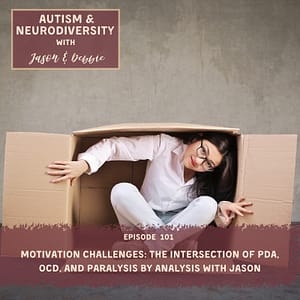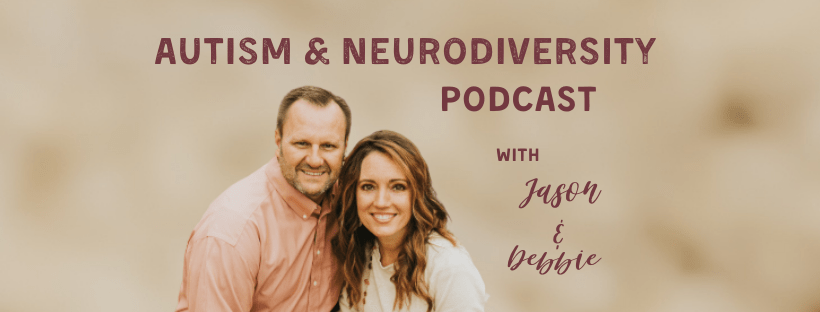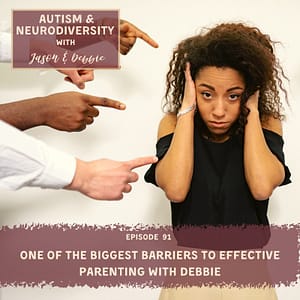[00:03] Speaker A: Welcome to the Autism and Neurodiversity podcast.
[00:06] Speaker B: We’re here to bring you helpful information from leading experts and give you effective tools and support. I’m Jason Grygla, a licensed counselor and founder of Techie for Life, a specialized mentoring program for neurodiverse young adults.
[00:19] Speaker A: And I’m Debbie Grygla, a certified life coach. And maybe most importantly, we’re also parents, parents to our own atypical Young Adults.
[00:30] Speaker A: Friends. Hello. Welcome. Glad to have you here. I am recording this, and it is snowing outside. I’m recording this in February. You may be listening to this in a different month, but it is snowing in southern Utah. We have had so much snow and rain and wow. I think Mother Nature is trying to solve the 20 years of drought we’ve had here all in one winter. And it’s just amazing. And every time I’m like, oh, my gosh, it’s snowing crazy. Anyway, it’s a little distracting. It’s so pretty out there today.
I want to talk to you. I know so many of you are working to better understand and support your autistic and your neuro divergent loved ones. And I want you to be able to gain awareness of one of the biggest barriers to effectively parenting or working with neuro divergence that I do a lot of coaching on and I work with parents a lot on, and that is actually judgment. And overcoming our judgmental tendencies is just an absolute game changer. And when we stay in judgment and we continue to replay our judgmental beliefs and stories and thoughts that we have about our young people, the more we actually inadvertently sabotage so many of our efforts. And it can actually be a big reason that young people get and actually stay stuck.
It’s one thing to have a disability, and then it’s another thing to feel judged in your disability and what that does to a person. And a lot of the young adults that we work with at our school, Techie for Life, where we’d mentor and support autistic and neurodivergent young adults with their next steps in adulting, many of them come to us, and they’ve just been stuck for a long time. And one of the things that plays into that is judgment, judgment that they’ve sensed or felt from parents or different professionals, teachers, peers. Judgment just eats us up.
And so it’s a very important topic, and it’s something that I’m continually working with parents on, and I want to bring your attention to it for this episode. So what you need to understand is that effective parenting and effective mentoring, when we’re being effective, we’re supporting a higher brain state in the young person we’re working with. And we can only do that if we’re in a higher brain state. And neurodivergents need to be in a higher brain state to be able to learn, to grow and develop. But so many of them, because they’re a neurodivergent in a neurotypical dominated world, but set up by neurotypicals for neurotypicals.
Being neurodivergent in our world, in our academic settings and work settings, in social settings is stressful for them. And many of them are in a constant triggered, fight, flight, nervous system threat response state. When they’re in that state, their energy and their emotions, their brain, their body resources are being directed to deal with threats. And so they don’t have the emotional capacity to be able to put the work in and the brain power to be able to develop, to grow, to take on challenges and be resilient, like to fail and get back up again, for example. And so the same goes for us.
We can’t be effective mentors if we’re in that lower brain triggered state. But when we’re in a higher brain state, when we’re really engaging our prefrontal cortex and our left and right hemispheres of our brain, like when we’re engaged and we’re like, I’m okay, I’m good, and that’s when we’re able to tap into being nurturing and empathetic and connecting and assessing what’s going on for someone. And we can creatively problem solve and collaborate and be innovative and intuitive and get back up again when something doesn’t work or it’s not effective, and we try again and try something else for that resourcefulness that comes from being in a higher brain state.
So we’re most effective when we’re in a higher brain state. Now, the lower brain’s job, that nervous system threat response, its job is to look out for potential threats. And then the higher brain is the part of us, that part of our brain that determines if there’s an actual threat. Now, when we judge, our lower brain has pointed out potential danger, and then we’re now, like, agreeing, oh, yeah, that’s bad, right? When we judge someone, we see a behavior, we see them, and we think something bad about them, something negative, right? And we then drop into a lower brain state. And, you know, because you’ll feel worried or anxious or stressed or overwhelmed or insecure or something that shows you’re in a lower brain state.
So when we judge and when I coach parents and they’re in judgment, and I some of the things that clue me in is when I hear things like, well, they shouldn’t be doing that or they should be doing this. I’m judging instead of assessing, this is what they’re doing. Why might they be doing it? They’re in judgment. They’re doing this thing, and they shouldn’t be, and it’s bad, or they’re trying different things, and they then judge, well, nothing ever works. And what’s implied in that is, and that’s bad. And so then they’re in a lower brain nervous system response.
Now, our judgment, that judgment to lower brain state, it influences our children, our teens and our young adults, and they can often be triggered by our lower brain state, by our nervous system threat response state. They then think their brain mirrors that and sees, oh, mom is stressed, or the teacher is stressed and they will then go into a stressed state, they will get triggered like, oh no, danger, something’s wrong.
Okay, I want you to think about when you’ve had people judge you. Let’s say for example, you’re at the grocery store and your autistic child is having a meltdown. Because of course when we go into stores where it’s a very high dopamine environment and their brain can’t regulate that desire to seek for what’s in the store, right? The store is literally designed to create a dopamine. Like you want to eat me, you want to buy me, you want to touch me, you want to take me home. Sitting in the store is set up and design and display case set up candy, like all the candy and gum and knickknacks as you’re trying to check out of the store. All of these things are put where they’re put and set up in a way to get you to buy the stuff, right, to get you to want it, to desire it. It’s a very dopamine inducing environment.
And of course our autistic child going into that that doesn’t have great nervous system regulation has a really hard time and then or it could just be the sensory environment, right, the lights and the busyness and the people and all the things might play into. But either way you’ve got an autistic child in the store melting down. It’s a common scenario. And then of course that old man walks by and makes a comment, what’s wrong with your kid? Or that kid needs a spanking. They judge us as a parent or they judge our kid that’s having a meltdown. And what do we do? What do we feel? If you haven’t practiced that, if you haven’t worked at it a lot of time, our response is a fight, flight, freeze, danger.
This is a problem. We’re experiencing their judgment like they think something’s bad or wrong. And then we’re like agreeing with our nervous systems like, oh no, danger, yeah, you’re right, this is bad. And we get fighty, right? Like we want to say something nasty back to them or we start fighting them in our mind and we’re just arguing with them and mad, this person shouldn’t be this way in our mind. Or we go into fear where we’re just to get out of that store and panic and try to get away from them. Or maybe we freeze that. That was always mine. When someone would say a rude comment to me, my brain would just freeze up, be so shocked. We’re so rude. I couldn’t think of any response or just freeze up. And then of course I get in the car and I think of all these other ways I could have responded or handled it in the moment. I’m just really this person just said that.
Or maybe it’s a fun response or your tendency is you just buy the thing or you spank the child because you think that’s what people want you to do. And so you don’t actually parent the way you want to be parenting. You’re trying to please this stranger that’s judging you and please them and do what they’re wanting you to do. Just know I have zero judgment if you’re any of those if that’s how you handled it. It is a stressful thing to be in a situation like that. And I’m just using this one as an example. When other people judge us, we often will get triggered into a fight flight freeze response if we haven’t done the work and really honed in on things and maybe done a lot of gotten coaching or done a lot of self coaching to be able to handle those kinds of judgments. The normal natural default response to judgment is to go into a protective state, put walls up, disconnect or fight and go at it, right?
And so you think about your child. When you have a judgmental thought, you see a behavior and then you deem it as bad or they shouldn’t be doing that or it’s a problem, they sense our nervous system state and they then get triggered into a nervous system response. And if we’re constantly judging their behaviors as bad or problem or not what they should be doing, we’re constantly in a lower brain state. And we actually can contribute to there being in a more lower brain state, more of a triggered risk state. So I want you to be aware of that one. It’s kind of a sneaky thing and it’s a big one.
It not only undermines our effectiveness in being the parent and mentor that we want to be, it also undermines the relationship and being able to support emotional regulation in our child or teen or a young adult. And so starting to be aware of that is so powerful. And questioning those judgmental thoughts, taking a look at them and questioning them, noticing that when we are in judgment, how do we show up? Are we in a lower brain state or a higher brain state? Know that those judgmental thoughts aren’t doing you any favors. They don’t help you parent better. They don’t help you problem solve better, and they certainly don’t help your relationship with your child. It actually creates disconnect. It creates blocks.
Your child, your teenage, they’re going to want to distance themselves from you. They’re going to want to or they’ll try to people please, which is not healthy and exhausting. Over time, they start to do maladaptive behaviors trying to cope with that stress of judgment. And so once you be aware of that one, it’s probably one of the biggest things that keeps us from actually being able to support our autistic and our neuro divergence in effective ways. So once again, zero judgment on my part. If that’s something that you fall into very common, something we continually work on. I continually work on my own judgments. Police stories that aren’t serving me, and it’s just work that’s worth doing if we want to be that support.
So I love you all. Being a parent is challenging and trying to be able to be that support for someone that has challenges and disabilities and a brain that thinks and interacts in the world differently than ours might. Or maybe you are neurodivergent also and you’re trying to help your neurodivergent kiddo. It’s challenging. This is not an easy thing, and I appreciate you being here and listening and sharing this with others that are trying to parent and mentor their kids and know that I’m with you in this and this is not easy work we’re doing. But it is so valuable and so important to be able to look at things and examine and question old ways of doing things that aren’t working and start to recognize what’s behind the things that aren’t working for us. Thanks for being here. Love on your kiddos, but I hope you have an amazing week. Take care. Bye.
Speaker A: Thanks for joining us on this episode of Autism and Neurodiversity with Jason and Debbie. If you want to learn more about our work, come visit us at JasonDebbie.com. That’s JasonDebbie.com.




